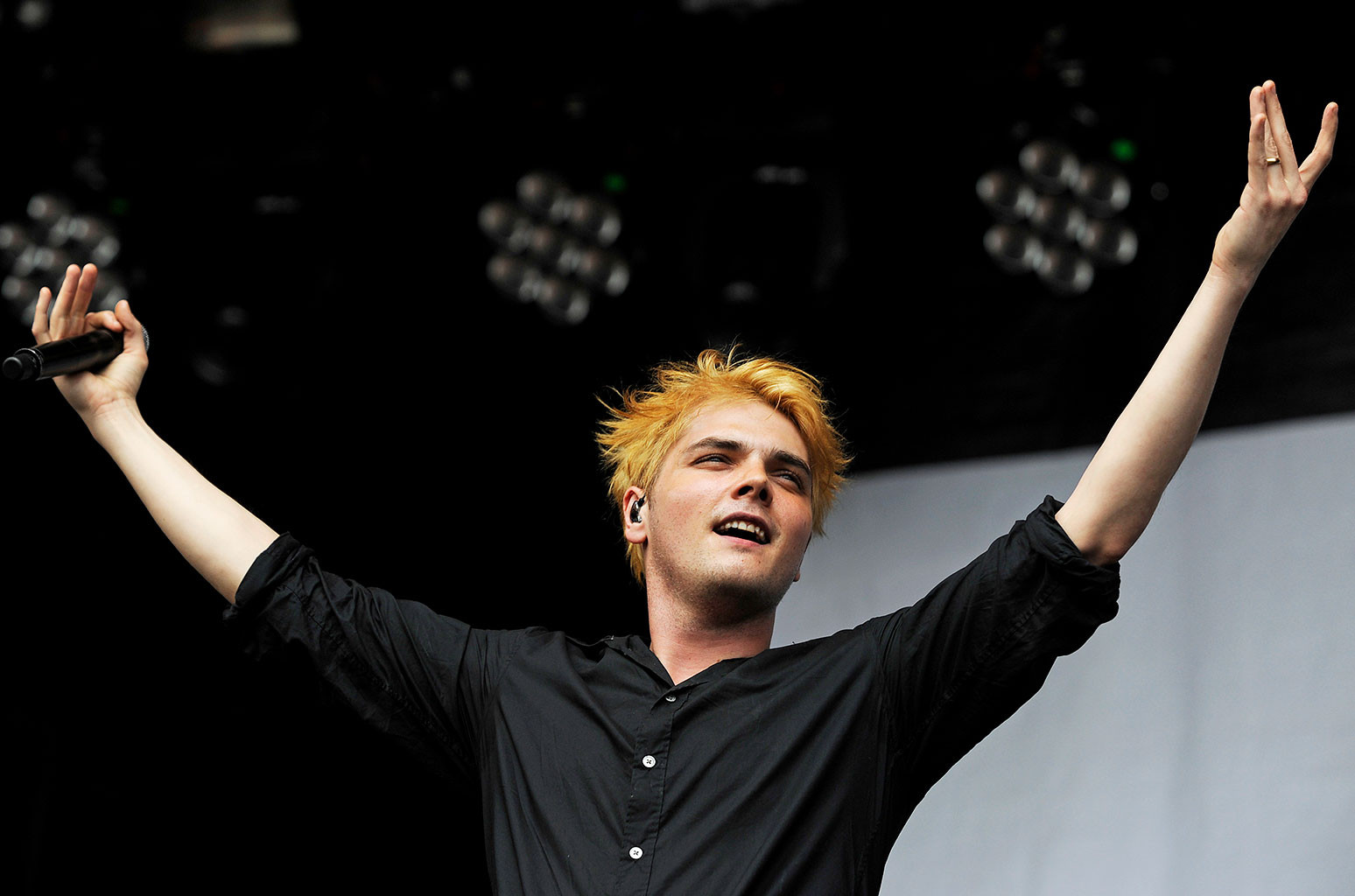My Chemical Romance’s reunion has ignited a global celebration among fans, prompting a renewed appreciation for their impactful discography from 2002 to 2010. While debates rage on about whether this reunion will bring new music, it’s the perfect moment to revisit the anthems that defined a generation. Although some fans champion their raw debut album I Brought You My Bullets, You Brought Me Your Love or the conceptually ambitious Danger Days: The True Lives of the Fabulous Killjoys, payoffsong.com believes the pinnacle of their artistry lies within the potent tracks of their sophomore album, 2004’s Three Cheers for Sweet Revenge, and their commercially triumphant 2006 masterpiece, The Black Parade.
In honor of My Chemical Romance’s highly anticipated return, payoffsong.com presents a curated list of 15 of their most exceptional Chemical Romance Songs. Dive in and see if your favorites made the cut.
15. “Vampires Will Never Hurt You” (I Brought You My Bullets, You Brought Me Your Love)
Opening with a compelling blend of thumping percussion and a subtly menacing guitar riff, “Vampires Will Never Hurt You” from I Brought You My Bullets, You Brought Me Your Love explodes into life with its chorus and maintains relentless energy. The song’s vampire metaphor becomes a vehicle for some of the most dramatically emo lyrics in MCR’s arsenal, exemplified by lines like, “And these thoughts of endless night/ Bring us back into the light/ Can you stake my heart?” This track perfectly encapsulates the band’s early, raw sound and gothic romanticism.
14. “The Kids From Yesterday” (Danger Days: The True Lives of the Fabulous Killjoys)
Unknowingly serving as a poignant farewell, “The Kids From Yesterday,” the final single before MCR’s hiatus, from Danger Days: The True Lives of the Fabulous Killjoys, embodies the bittersweet essence of endings. Its melancholic melody, intertwined with lyrics reflecting on adulthood and change, resonated deeply as a final, teary-eyed goodbye from the band to their devoted fanbase. This song showcases a more mature and reflective side of My Chemical Romance, making it a standout in their later work.
13. “Mama” (The Black Parade)
“Mama,” a wildly theatrical B-side from The Black Parade, is what happens when you combine My Chemical Romance with an extravagant sense of camp and a legendary guest star. Featuring constant shifts in musical style, Gerard Way’s increasingly theatrical vocals, and a cameo from the iconic Liza Minnelli, “Mama” remains one of MCR’s most eccentric and captivating creations. Its sheer audacity and over-the-top performance solidify its place as a unique and unforgettable track in their discography.
12. “The Ghost of You” (Three Cheers for Sweet Revenge)
While perhaps not as immediately catchy as other singles from Three Cheers For Sweet Revenge, “The Ghost of You” holds a special place in the hearts of My Chem devotees thanks to its deeply emotional and anthemic chorus. Adding to its impact, the music video is one of MCR’s most cinematic and intense, transforming a narrative of loss into a powerful, D-Day-inspired visual experience that amplifies the song’s emotional weight. This song is a testament to MCR’s ability to blend raw emotion with cinematic storytelling.
11. “Skylines and Turnstiles” (I Brought You My Bullets, You Brought Me Your Love)
Creating a song about the September 11 attacks is a formidable challenge for any artist. My Chemical Romance tackled this sensitive subject with “Skylines and Turnstiles,” released shortly after the tragedy, demonstrating remarkable courage for a band in its early stages. The song sensitively captures the raw emotion of the moment without exploiting the tragedy, striking a delicate balance. “Skylines and Turnstiles” not only became an early single but also significantly shaped the band’s musical direction and thematic concerns throughout their career, marking a pivotal moment in their development.
10. “Cancer” (The Black Parade)
My Chemical Romance may not be immediately associated with ballads, but “Cancer” from The Black Parade proves their mastery of heartbreakingly tender songs. True to its title, “Cancer” is a stark and poignant depiction of battling illness, underscored by a melancholic piano riff that intensifies the emotional impact. This track reveals a deeper layer of emotional vulnerability in MCR’s music, proving their range beyond high-energy anthems. Who knew MCR could evoke such profound sadness even more intensely than “The Ghost of You”?
9. “You Know What They Do to Guys Like Us in Prison” (Three Cheers for Sweet Revenge)
Beginning with a deceptively funky rhythm, “You Know What They Do to Guys Like Us in Prison” quickly descends into pure, unadulterated emo-rock frenzy. MCR spins a campy, theatrical tale of a prison inmate developing feelings for his cellmate. This track exemplifies My Chemical Romance’s penchant for theatrical delivery, with Gerard Way’s passionate vocals soaring over high-octane guitar riffs and drum fills, evoking a sense of chaotic prison riot. It’s a perfect example of their ability to blend dark humor with high-energy performance.
8. “I Don’t Love You” (The Black Parade)
“I Don’t Love You” stands as one of My Chemical Romance’s most criminally underrated singles. While their high-energy, headbanging anthems often steal the spotlight, the intricate guitar work and Gerard Way’s yearning vocals in “I Don’t Love You” make its breakup narrative intensely poignant. For anyone who has experienced the painful process of falling out of love, the song’s final, powerful vocal delivery offers a cathartic release. This song highlights MCR’s ability to craft emotionally resonant ballads that are just as compelling as their more aggressive tracks.
7. “Vampire Money” (Danger Days: The True Lives of the Fabulous Killjoys)
 Gerard Way performing with My Chemical Romance in 2012
Gerard Way performing with My Chemical Romance in 2012
Alt text: My Chemical Romance frontman Gerard Way passionately sings onstage during a 2012 performance.
Danger Days is often perceived as My Chemical Romance’s venture into a more commercial, pop-influenced sound. However, just as the album nears its conclusion, “Vampire Money” erupts—a raw, punk-infused track complete with distorted guitars, a driving drum riff, and Gerard Way’s almost chaotic vocal performance. The song also subtly critiques the Twilight franchise, which had approached the band for a soundtrack contribution. Instead of “selling out,” they created this defiant anthem. “Vampire Money” serves as a powerful, punk rock statement against commercial pressures.
6. “Teenagers” (The Black Parade)
“Teenagers” is one of My Chemical Romance’s most unifying songs, fueled by its chant-worthy chorus and punchy verses. Ironically, it critiques the very demographic that formed the core of MCR’s fanbase: teenagers. Thirteen years later, those teenage fans, now adults, understand the anxieties the band members, then in their late twenties, expressed in 2006. The song’s themes of teenage angst and societal fear resonate even more powerfully today, solidifying its status as a timeless anthem.
5. “Famous Last Words” (The Black Parade)
Ending an album centered on death with a hopeful anthem might seem counterintuitive, yet “Famous Last Words” sees My Chemical Romance fiercely championing resilience against cynicism and despair. The music video dramatically portrays the fictional Black Parade band literally burning down around them, while they defiantly continue to perform. This powerful imagery, combined with the song’s uplifting message, makes “Famous Last Words” a standout track about perseverance and hope in the face of adversity.
4. “Helena” (Three Cheers for Sweet Revenge)
Alt text: My Chemical Romance band members pose for a promotional photo for their album Three Cheers for Sweet Revenge, showcasing their signature emo style.
“Helena” from Three Cheers For Sweet Revenge was a transformative moment for My Chemical Romance and the mainstream punk scene. It was their first single to break into Top 40 radio, signaling their arrival as a major force. Just sixteen seconds after Gerard Way’s haunting opening vocals, “Helena” explodes into a captivating whirlwind of slamming drums and roaring guitars. Equally enjoyable to thrash to and scream along with its iconic “So long and goodnight” hook, “Helena” remains a fan favorite and a defining song of the early 2000s emo era.
3. “Dead!” (The Black Parade)
Even within the dark conceptual framework of The Black Parade, My Chemical Romance injects moments of dark humor and fun. “Dead!,” the album’s opening track, tackles the concept of mortality with sarcasm and theatrical flair, announcing the protagonist’s demise with a twisted sense of glee. Gerard Way delivers a masterful vocal performance, relishing every syllable, but the song’s true star is lead guitarist Ray Toro, whose shredding guitar work adds an electrifying edge. If The Black Parade is about death, then “Dead!” is a direct, exhilarating shot to the heart, grabbing the listener’s attention immediately.
2. “I’m Not Okay (I Promise)” (Three Cheers for Sweet Revenge)
Ask any emo kid who lived through the mid-2000s about their defining song of that era, and “I’m Not Okay (I Promise)” is the almost guaranteed answer. The song’s infectious melody is instantly memorable, compelling listeners to headbang and release their pent-up emotions. Gerard Way’s angsty vocal delivery perfectly captures the feeling of being misunderstood and alienated. The iconic music video, styled as a trailer for a fictional film about bullied prep-school students seeking revenge, further cemented the song’s cultural impact. “I’m Not Okay” propelled MCR to global fame and endures as the quintessential emo anthem, encapsulating the genre’s spirit.
1. “Welcome to the Black Parade” (The Black Parade)
 Gerard Way performing with My Chemical Romance in 2012
Gerard Way performing with My Chemical Romance in 2012
Alt text: My Chemical Romance band members passionately perform their hit song Welcome to the Black Parade during a live concert, bathed in stage lights.
In an era dominated by pop-punk, My Chemical Romance dared to defy genre boundaries with “Welcome to the Black Parade.” This track seamlessly blends diverse rock elements into a cohesive and epic whole. Featuring soaring electric guitars, a powerful drumline, sing-along verses, and poignant piano melodies, this five-minute anthem feels like a call to arms, inviting listeners to join the Black Parade, chanting “We’ll carry on!” in unison. The overwhelming response confirmed its impact: “Welcome to the Black Parade” reached No. 9 on the Billboard Hot 100 and No. 1 on the Alternative Songs chart. It transcended mainstream rock, proving that everyone, in some way, could embrace their inner emo. This song is not just a hit; it’s a cultural phenomenon and the ultimate chemical romance song.

